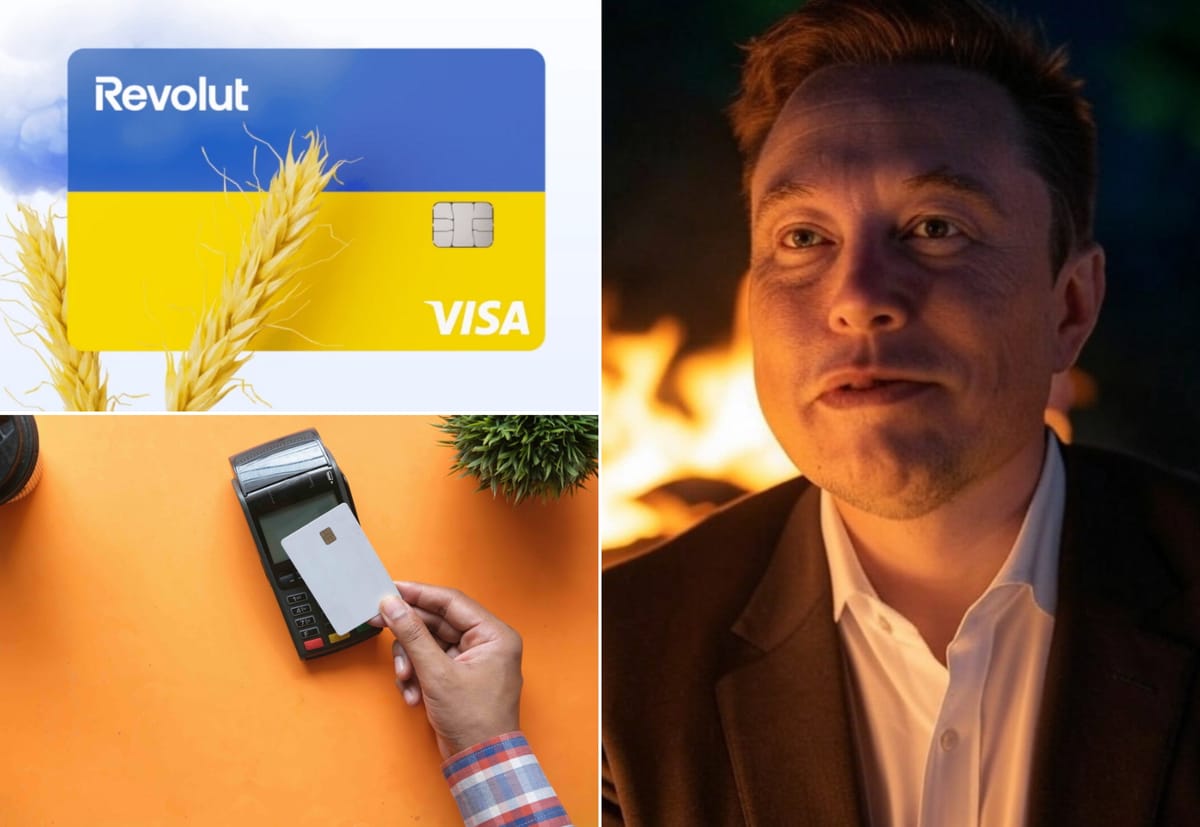Money Machine: Open Banking vs Elon Musk & dire warnings from the BoE
Brace for shocks and systemic risk as DOGE continues to savage America's public sector...

Welcome to the second edition of Money Machine - the first in a series of newsletters covering fintech, crypto and financial services published by Machine and written by me Jasper Hamill (for now).
We hope to cover topics ranging from robotics to existential risk in our newsletters, so I can indulge my curious love of writing stories about the end of the world.
And yes. They will all have Machine in the title in some way or other.
Sadly, the apocalypse will probably have to wait as we're focusing on specialist or B2B topics for the time being.
Reimbursing the victims of APP fraud

The Payment Systems Regulator's Head of Policy, Kate Fitzgerald, has issed an update on plans for Pay.UK to deliver a centralised Reimbursement Claims Management System (RCMS) for use by all directed UK payment service providers (PSPs).
New APP scam protections took effect on 7 October, ensuring victims of Authorised Push Payment (APP) fraud can get their money back. APP scams involve fraudsters tricking victims into sending money to their accounts.
Regulators plan to consult in April 2025 on requiring PSPs to use Pay.UK’s RCMS for claims management and reporting.
The PSR wants to hear from stakeholders and will be seeking contributions to its consultation. Visit its website for more info.
European regulators take mercy on the financial sector

The EU has been on a regulatory tear for a very long time now, battering financial services and the wider tech sector with a huge array of rules ranging from the AI Act to DORA. Now Eurocrats appear to be exhibiting a trait they don't show us very often: mercy.
The European Commission (EC) appears to be planning to axe the Financial Data Access (FiDA) Regulation.
According to a document obtained by POLITICO, the FIDA proposal will be withdrawn by mid-2025 due to concerns about adding complexity and burdening financial institutions - contradicting the EU’s goal of simplifying regulations.
Introduced in June 2023, FIDA aimed to improve consumer access to financial data by requiring banks, insurers, and asset managers to share customer data with both clients and competitors. EU member states reached a preliminary agreement on the draft in December 2024, believing it would foster innovation and help to deliver personalised financial services.
However, financial industry groups pushed back, questioning its feasibility and necessity. In December 2024, six major industry associations wrote a letter criticising the Commission for not fully evaluating the costs, arguing that their concerns had been repeatedly ignored.
Florence Lustman, chair of France Assureurs, also said FiDA was "a runaway train speeding ahead with no driver and no brakes".
And yes. It's unusual and wonderful to hear Brussels talk about cutting complexity and lightening the regulatory load. Is this the Trump effect in action - or is something else at play?
Open Banking vs Elon Musk

The Consumer Financial Protection Bureau has raised almost $21 billion in compensation for Americans and is at the forefront of implementing Open Banking in the US.
Now it appears to be the latest victim of President Trump and Elon Musk's DOGE, which is currently piling public bodies onto the bonfire in a bid to cut waste and overspending.
The CFPB was in the process of finalising the so-called Open Banking rule enabled by Section 1033 of the Dodd-Frank Act of 2010, which empowers consumers to transfer their financial data to other institutions or third-party apps without fees.
Although the US Open Banking ecosystem is largely market-based, the rules would have established a regulatory framework to ensure data-sharing is secure, standardized, and consumer-friendly.
British Open Banking pioneers have questioned the apparent decision to shut down the CFPB.
Chris Michael, co-founder of Ozone API, led the development of the UK's Open Banking Standard - which sets the rules for customers to share their bank account data securely.
On LinkedIn, he said Open Banking rules are "a key ingredient to enable better financial services for both personal and business customers" which will drive "significant value and economic growth.
"Regulation is still important in this context, since it provides additional customer protection," he added. "So I am hopeful that common sense will prevail here, and that the CFPB will be allowed to see this particular regulation through, since this will benefit the US economy."
One of Ozone's other co-founders, Huw Davies, also wrote: "There is a lot of noise and conjecture in the US right now and questions about what it means for Section 1033. But the reality is open banking is already happening at scale and based on standards-based APIs (with over 96 million accounts actively connected via APIs aligned to the Financial Data Exchange standard). A wrapper of rules and regulation is important to ensure a sustainable ecosystem. Hopefully sense will prevail."
Full transparency: I worked on copywriting and PR consultancy for Ozone API through an agency. A fascinating company and mega-interesting founders!
Your call is no longer important to us...

There's no better way for banks to show customers they care than by sacking all their contact centre staff and replacing them with a semi-useless bot.
We jest of course. Anyone who has encountered the "computer says no" moment of hitting the limits of a chatbot's abilities and then fruitlessly bashed "speak to a human" into its text box will know the truth. AI has a long way to go until it's anywhere near as helpful as a real person.
The dawn of the customer-service-as-a-service sector is truly terrible news for consumers - at least in the short term. Now Google has given us a glimpse of the nightmare ahead in it's patent for "personalized chatbots that can answer calls on behalf of the users and dynamically adapt a level of interaction required by the users".
In its patent, Google says its AI-powered personalized chatbot can handle calls on a user’s behalf, allowing them to choose whether to offer a fully automated response, partial assistance or let a human take the call.
For banks, this could streamline customer service by verifying transactions, confirming account changes, or handling routine inquiries, Google said.
The chatbot operates on-device for faster responses and enhanced privacy, using AI models for speech recognition, natural language processing, and decision-making.
So it's probably time to bid farewell to millions of human contact centre staff as decent customer service fades into memory - temporarily. We're sure chatbots will be great one day. But that moment is still very far away.
Check patent number US-12225158-B2 for more info.
Revolut expands services to residents of Ukraine

Revolut has expanded its services to Ukranian citizens after partnering with Diia, the nation's e-government platform.
Ukrainian residents will be able to open a European Revolut account and use a range of products including instant, fee-free P2P transfers, foreign exchange and remittance capabilities in 30+ currencies, and borderless money transfers worldwide.
This means that Ukrainian residents can now send and receive money from their friends and family abroad without worrying about expensive transfer fees.
A new special edition Clear Sky debit card is also available to order for Revolut customers in the UK, across EEA, and in Ukraine.
Vladyslav Y., co-founder and CTO, said: "A record number of Ukrainians have joined our waiting list to be among the first to get their Revolut account. Interest in Revolut and digital banking services is soaring in the CEE region. Starting today Ukrainians can open a Revolut account and access our most popular products, with even more coming soon.”
Dmytro Strelchuk, Revolut’s head of new markets launch added: “It will facilitate free and instant money transfers across Revolut’s global community of 50 million users and will help to increase the flow of funds into Ukraine for people who want to support their families and relatives at this challenging time.“
Grim warnings from the Bank of England

As mentioned above, we love stories of the apocalypse. But we're not sure if we'd include financial cataclysms under that rubric. Most doomsday scenarios don't come to pass, whereas warnings of imminent systemic shocks have a grim realism which makes for unsettling reading.
So we're not very glad to report that Bank of England bigwigs have made some rather ominous warnings in speeches delivered during February 2025.
In a talk called "Are we underestimating changes in financial markets?" delivered at the University of Chicago Booth School of Business, London, Governor Andrew Bailey highlighted the growing systemic risks in financial markets due to the shift of activity away from banks and into the non-bank financial sector.
This transformation, while a response to past crises, has created new vulnerabilities that could amplify shocks, especially as hedge funds, high-frequency traders, and systematic funds take on more leverage.
Bailey called for enhanced surveillance and stress testing rather than broad new regulations to safeguard financial stability.
But that's not all. Megan Greene, member of the Monetary Policy Committee, delivered a talk called "Not such an island after all" to the Institute of Directors.
Greene said Britain is dangerously exposed to global shocks that could trigger a financial disaster, painting a picture of a nation at the mercy of international turmoil, spiralling inflation, and looming trade wars.
The UK’s deep ties to global finance mean that a market panic, foreign downturn, or financial crisis could drag Britain into economic turmoil. Meanwhile, the UK’s food and energy supply chains are frighteningly fragile, meaning we're just one global disruption away from crippling shortages and unaffordable prices.
Already, signs of collapse are emerging. Businesses have stopped hiring, confidence is crumbling, and inflation remains stubbornly high.
If another global crisis strikes, the UK could be in big trouble.
Sweet dreams everyone.
See you next week for the third edition of Money Machine.




